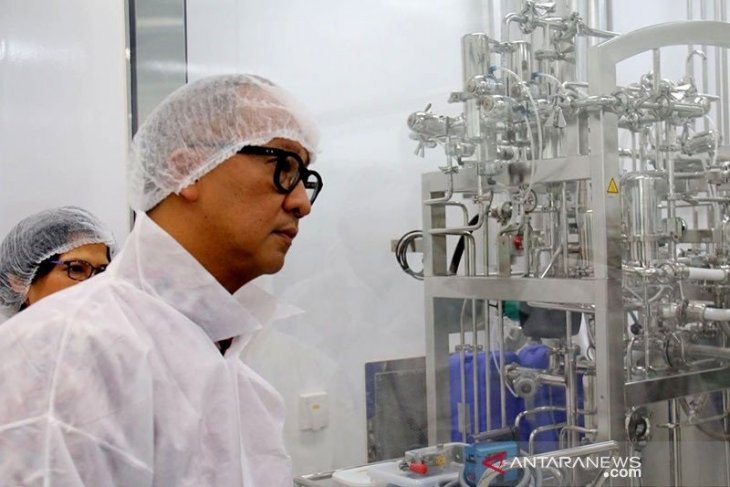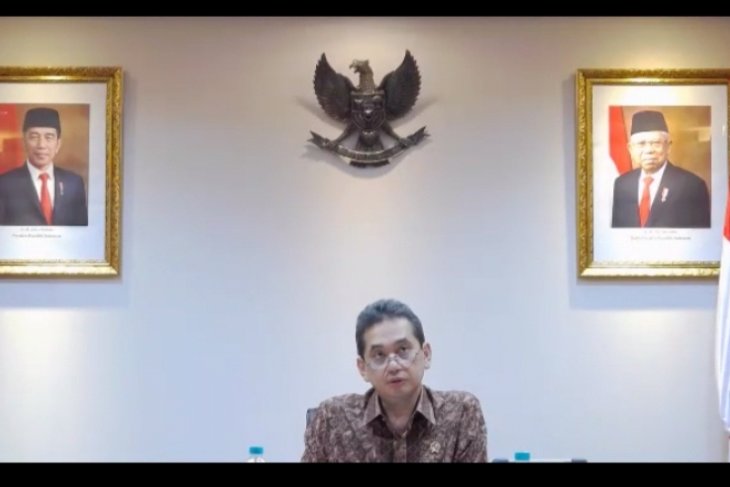Live Streaming
Program Highlight
Company Profile
June
Basic Metal, Food Industries Remain Leading Sectors in Exports: Government
Written by Ani Hasanah
Industry Minister Agus Gumiwang Kartasasmita. ANTARA/HO-Industry Ministry/sh
Basic metal and food industries are projected to continue to be the leading sectors for Indonesian exports, as they have contributed significantly to the country's revenue amid the COVID-19 crisis.
"The metal industry's positive record has demonstrated that the downstreaming policy has run well. It could increase the added value of domestic raw material and meet the demand of the international market," Industry Minister Agus Gumiwang Kartasasmita stated here on Friday.
The Central Bureau of Statistics (BPS) recorded that during the initial five months of the year, non-oil and gas processing industry exports crossed US$51 billion, thereby contributing 79.25 percent to the country's total exports at $64.4 billion.
"We are committed to boosting the export-oriented industry to bolster the national economy," the minister noted.
Among the industries is the base metal industry that registered a 41-percent increase in exports during the period from January to May 2020 to reach $9.2 billion, from $6.5 billion worth of exports during the corresponding period of 2019.
In the same way, food industry exports during the period rose by eight percent to touch $11.4 billion, from $10.5 billion of exports in 2019.
"We have set a target for our food and beverage industries to dominate the Southeast Asian market in line with the roadmap of Making Indonesia 4.0," he stated.
Other manufacturing sectors to have significantly contributed to the country's exports comprise the chemical and chemical goods industry, with $4.9 billion of exports, followed by the garment industry, $2.8 billion; computer, electronic goods, and optics, $2.4 billion; and leather, leather goods, and footwear, $2.3 billion.
"In terms of the chemical industry, we have targeted to become a leading player in the biochemical industry, whereas, for the textile and garment industry, the government has focused on functional clothing," he revealed.
Computers, electronic goods, and optic industry exports increased by 14 percent, from $2.1 billion of exports during the corresponding period in 2019. The government is channeling attention on the domestic market for the sector, Kartasasmita explained.
"We are optimistic that by 2030, Indonesia would be part of the world’s 10 largest economies by seriously developing the export-oriented sector," he asserted.
Kartasasmita expressed a belief that the manufacturing industry would forge ahead at a swifter pace after the COVID-19 crisis is overcome, as the operational license has been issued for the strategic industry, with stringent adherence to health protocols.
"There should be no wide gap in productivity, and we should not lag behind. After the vaccine for COVID-19 is found, it would not take long for the manufacturing industry to rebound," he pointed out. (ANTARA)
Belarusian Automobile Engineering Company BelAZ Named Indonesia one of its Most Important Partners
Written by Ani HasanahThe Belarusian automobile engineering company, BelAZ, is one of the world's main manufacturers of heavy-duty trucks. It is one of the flagship companies in Belarus, which is always under close attention to the state. About 95% of products are exported. According to the Press Release of Belarus Embassy received by Voice of Indonesia in Jakarta, Friday (19.06), BelAZ is particularly interested in Asia and Latin America. For the last five years, Indonesia has consistently been one of the top three largest markets for mining equipment. Over the past four years, BelAZ has shipped more than 50 vehicles with a carrying capacity of 110-130t to Indonesia.
Today BelAZ pays great attention to the development of interesting new products. The company has been working on robotization for many years. BelAZ sold the first few unmanned 130-tonne haul trucks to Russia's Siberian Coal Energy Company SUEK. They are undergoing tests in Russia's Khakassia. In 2020, BelAZ intends to demonstrate its robotic complex in Belarus. The company plans to send there a 90-tonne haul truck and a remotely operated loader.
Another interesting direction is electric dump trucks. BelAZ has designed a diesel trolley truck, an electric trolley truck, and an electric dump truck. The diesel trolley truck and the electric trolley truck use a certain amount of external electricity fed by trolley lines. BelAZ expects the increasing interest towards its new products, especially among South-East Asian countries. (Release Embassy of Belarus)
June
Literacy Makes Society Stay Creative and Productive in the New Normal Era
Written by nuke
photo : perpusnas
In this new normal, people must remain creative and productive, even though they are still in the covid-19 pandemic that has not subsided in the country. Literacy is the answer so that someone is able to read the situation well, explore further knowledge, and can transform into knowledge and products or services in a bid to improve quality of life. This is the core of the webinar entitled "Rising from a Pandemic with Literacy" held by the National Library of Indonesia along with the National Development Planning Agency (Bappenas), Wednesday (06/17). The event was attended by 1,000 participants consisting of representatives of ministries / institutions, regional governments of Bappeda and library services, academics, literacy activists and the general public. Head of the National Library, M. Syarif Bando said that the library is a solution to improve the intelligence and empowerment of the nation which has a significant impact on the end users. This has increased infrastructure for access to information and knowledge, strengthened the sources of knowledge and the value of information for individuals. The keynote speaker in the webinar who was also the Minister of National Development Planning / Head of the National Development Planning Agency (Bappenas), Suharso Monoarfa emphasized the need to strengthen the culture of community literacy as an effort to be able to rise from adversity. This is important because literacy as a form of cognitive skills has a major role to play in the socio-economic recovery of post Covid-19 societies//NK
June
Reopening of Malls will Hopefully Reactivate Trade: Minister
Written by Ani Hasanah
Minister of Trade, Agus Suparmanto. (ANTARA/Aji Cakti)
Indonesia’s Minister of Trade, Agus Suparmanto, has expressed the hope that the reopening of retail businesses and shopping malls, with the implementation of health protocols, would help revive economic activity in the new normal era.
"There is indeed a drastic decline (in trade), at the moment, due to the COVID-19 pandemic situation. For that reason, economic activities need to be reactivated through the opening of retail businesses and shopping centers, while still prioritizing health protocols," Minister Suparmanto said during a virtual discussion on Thursday in Jakarta.
The minister stated that he has been monitoring the situation following the reopening of shopping centers a few days ago, and added there has been considerable enthusiasm from the public over malls opening their doors again.
In the current situation, amid a pandemic that has spread across the world, including in Indonesia, there needs to be prompt response in the face of COVID-19, he remarked.
The Indonesian government has continued to give priority to public health security and safety in every activity, including trade, he pointed out.
"In this (current) scenario, health protocols are very important and there needs to be awareness and strict discipline in carrying out trade activities, especially in modern retail and shopping centers," he continued.
He further said there has been a significant decline in trade in the past two months due to the number of inactive retail businesses.
The COVID-19 pandemic has shifted how people engage in social activities, including trade, he said. People are now required to wear masks, maintain a safe distance, and wear gloves. They also need to frequently wash their hands and avoid unnecessary contact with others.
He further said that, at the moment, the DKI Jakarta government and Governor Anies Baswedan are implementing health protocols well.
"Hopefully, this can be an example (to others) and can be sustained, so that retail revenues can increase after two months of closure," the minister said. (ANTARA)



